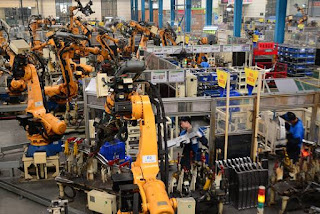Would the entrepreneurs save the day?
There is a jobs crisis within the global supply chain. Squeezed between trade tensions and process automation, the global service economy that would have lifted all - or at least most - boats, hasn't been doing well lately. Even before the Corona Virus moment, China's factories were using two-thirds of the labour for like-for-like jobs compared to only a few years earlier. Ever-expanding back-offices in India had no net new hiring for some time now. And, yet, millions of people in these countries, as well as in Africa, South East Asia and the Americas, are reaching working age every month and looking for work. It seems that the great middle-class dream is about to go bust.
But you always meet a particular kind of people who read book summaries and take the conference presentations too seriously. They were never out there and they usually find details boring. They keep their prophecies in the abstract, big picture level. For them, stories of the economic slide of the middle class are irrelevant because 'millions have been lifted out of poverty'; the stalling of social mobility is only a temporary blip in the unstoppable train of progress. Seen from this very woke corner of the world, entrepreneurs would save the world.
So, would they? Is the future of work is in entrepreneurship - and are we all going to be our own start-ups?
At one level, this is indeed correct. Entrepreneurship in this particular context means living the uncertain life of zero-hour contracts and permanently floating self-employment. This entrepreneurship, for the most part, is all blood, sweat and tears, with no silver bullet in the end. This is about working forever for the sake multiplying someone else's money, just as wage labour used to be. The only difference is the collectivity: When wage labour became too problematic as that was giving everyone a common identity, we spun it into entrepreneurship. In this, we as workers are all on our own, competing for crumbs with one another. This entrepreneur avatar is not about saving the world, but a symptom of the end of times.
Then, there is, of course, the 'job creator' narrative. This version is that the entrepreneurs create new jobs, new kinds of jobs, to keep the technological unemployment at bay. This is what Business Schools and Government Ministers preach every waking moment: That the new talented individuals, armed with their MBAs, will not bother placement departments but rather go on creating jobs and save the world from annihilation from idleness. But, as they forget to mention, their MBAs are all about how not to create jobs and not to create value for anyone else other than the shareholders, themselves. In fact, these 'entrepreneurs' are trained to direct technology at human beings and destroy jobs rather than create them.
Sadly, these entrepreneurs will not save the world because they are not meant to. Generations of entrepreneurs have been trained in a very speculative art of making money out of nothing: They would rather do bitcoins than primary education. They would rather talk about exit than building up; five years is too long a horizon, too boring. The patient work of creation, of making sense, of building a learning society that can take advantage of technological progress and direct its course sensibly must fall on someone else.
So, would they? Is the future of work is in entrepreneurship - and are we all going to be our own start-ups?
At one level, this is indeed correct. Entrepreneurship in this particular context means living the uncertain life of zero-hour contracts and permanently floating self-employment. This entrepreneurship, for the most part, is all blood, sweat and tears, with no silver bullet in the end. This is about working forever for the sake multiplying someone else's money, just as wage labour used to be. The only difference is the collectivity: When wage labour became too problematic as that was giving everyone a common identity, we spun it into entrepreneurship. In this, we as workers are all on our own, competing for crumbs with one another. This entrepreneur avatar is not about saving the world, but a symptom of the end of times.
Then, there is, of course, the 'job creator' narrative. This version is that the entrepreneurs create new jobs, new kinds of jobs, to keep the technological unemployment at bay. This is what Business Schools and Government Ministers preach every waking moment: That the new talented individuals, armed with their MBAs, will not bother placement departments but rather go on creating jobs and save the world from annihilation from idleness. But, as they forget to mention, their MBAs are all about how not to create jobs and not to create value for anyone else other than the shareholders, themselves. In fact, these 'entrepreneurs' are trained to direct technology at human beings and destroy jobs rather than create them.
Sadly, these entrepreneurs will not save the world because they are not meant to. Generations of entrepreneurs have been trained in a very speculative art of making money out of nothing: They would rather do bitcoins than primary education. They would rather talk about exit than building up; five years is too long a horizon, too boring. The patient work of creation, of making sense, of building a learning society that can take advantage of technological progress and direct its course sensibly must fall on someone else.


Comments